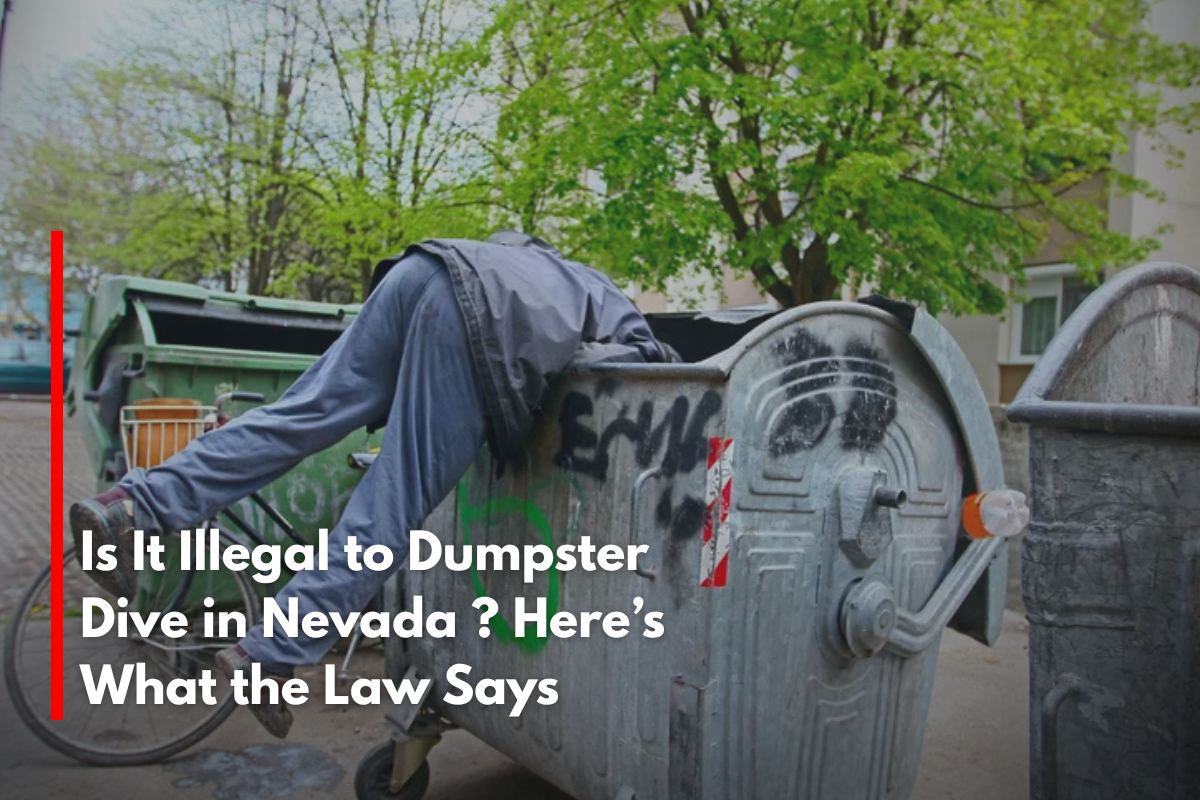Dumpster diving, the act of rummaging through trash bins or dumpsters in search of usable items, has gained attention nationally as both a means of finding free goods and a controversial legal issue. In Nevada, the legality of dumpster diving is shaped largely by local laws, especially in places like Las Vegas and Clark County. Here’s what you need to know about dumpster diving laws in Nevada in 2025.
Dumpster Diving Is Illegal in Las Vegas and Clark County
In the City of Las Vegas and throughout Clark County, dumpster diving is explicitly illegal. The practice is categorized under the legal term “interference with or removal of containers,” which means rummaging through another person’s or business’s trash is prohibited by local ordinance. According to Las Vegas municipal code (Code 9.08.080) and Clark County regulations, this act is considered a misdemeanor offense.
The penalties for getting caught dumpster diving in these areas are significant. For a first offense, individuals can face fines starting at $200 and face up to six months in jail. For repeat offenders, fines increase to $500 for a second conviction, and a third conviction carries a mandatory minimum jail sentence of 10 days plus the maximum fine of $1,000. Besides dumpster diving charges, violators might also be cited for additional misdemeanors such as trespassing, disorderly conduct, or littering, each carrying similar punishments.
Property Ownership and Trespassing Issues
One of the key reasons dumpster diving is illegal in many Nevada jurisdictions is that dumpsters are normally located on private property. Entering these premises without permission can lead to trespassing charges under Nevada law. Even if an individual is searching through trash bins on what appears to be public access, if the site is fenced, locked, or has posted “No Trespassing” signs, entry and rummaging can be considered criminal trespass.
Security personnel and local police in Las Vegas and Clark County generally enforce these laws strictly, especially because dumpster diving is sometimes linked to theft, fraudulent activities, or identity theft. Personal information such as credit card numbers, bank statements, and other sensitive documents discarded in trash bins make these sites targets for criminal activity, giving law enforcement further cause to crack down.
Exceptions and Clarifications
While dumpster diving is illegal in major population centers in Nevada like Las Vegas, it’s important to note there is no statewide ban explicitly outlawing dumpster diving. Some rural or less populated areas may have different rules or fewer enforcement actions, but property and local ordinances always apply.
Moreover, dumpster diving on your own property or going through your own trash before collection is legal. However, once trash leaves your property and enters public waste streams or dumpsters managed by others, it becomes “public domain,” and you no longer have legal rights to retrieve items from it.
Safety and Practical Considerations
Beyond legality, dumpster diving in Nevada carries safety risks. The extreme heat in desert regions can create hazardous conditions, with risks such as exposure to dangerous animals like scorpions or snakes. Food recovered from dumpsters may be spoiled or contaminated, posing health threats.
Alternatives to Dumpster Diving
Nevada residents looking for free or low-cost goods might consider safer and legal alternatives such as visiting food banks, thrift stores, or community swap meets. Many local organizations provide assistance without the legal risks associated with rummaging through trash.
Summary
Dumpster diving is illegal in Las Vegas and Clark County, Nevada, under local ordinances.
It is prosecuted as a misdemeanor with fines up to $1,000 and jail time up to six months.
Violations can also result in additional charges including trespassing and disorderly conduct.
Dumpsters are usually on private property, and entering without permission can lead to trespassing charges.
There is no explicit statewide ban in Nevada, but local laws apply.
Searching through your own trash on your property is legal, but once trash leaves your property, it is no longer yours.
Safety concerns in Nevada’s desert environment add to the risks of dumpster diving.
Legal alternatives such as food banks and thrift stores provide safer options.
Understanding the legal landscape around dumpster diving in Nevada helps avoid unintended consequences. While searching through discarded goods can be tempting, especially in difficult economic times, adhering to local laws and prioritizing personal safety are essential to avoid fines, jail time, and other legal troubles.
If you or someone you know is facing charges related to dumpster diving or trespassing in Nevada, consulting with a qualified attorney is advisable to understand rights and defenses.
This legal overview clarifies why dumpster diving is not a risk-free activity in much of Nevada and highlights the importance of respecting property laws and ordinances.
Sources
[1] https://www.shouselaw.com/nv/blog/laws/
[2] https://www.reddit.com/r/DumpsterDiving/comments/157cben/confused_about_legality/
[3] https://www.shouselaw.com/nv/blog/laws/is-dumpster-diving-illegal-in-las-vegas/
[4] https://www.youtube.com/watch?v=lNPprtvBmAc
[5] https://courtroomproven.com/blog/is-it-legal-to-dumpster-dive-in-las-vegas/











